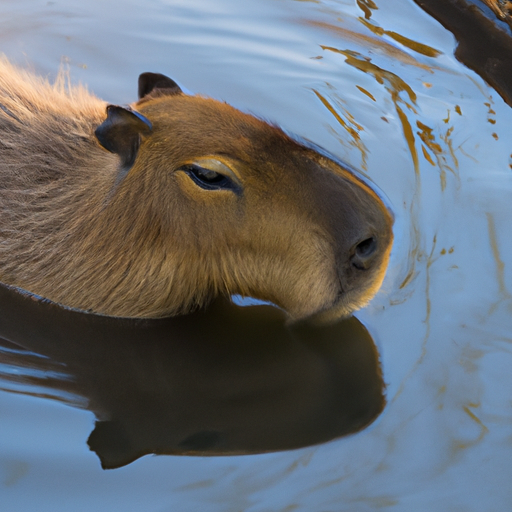Have you ever wondered if it’s legal to have a pet capybara in the UK? Well, the answer isn’t as straightforward as you may think. Capybaras, which are large rodents native to South America, have gained popularity as exotic pets in recent years. However, when it comes to keeping them in the UK, there are certain regulations and restrictions that you need to be aware of. So, if you’ve ever dreamt of having a capybara companion, let’s dive into the fascinating world of pet ownership and find out if it’s possible to fulfill that dream within the confines of UK law.

Background on capybaras
What are capybaras?
Capybaras are the largest living rodents in the world. They are native to South America and are known for their semi-aquatic lifestyle. These herbivorous creatures have a lifespan of around 8-10 years in the wild and can weigh up to 150 pounds. Capybaras are highly social animals and are often found in large groups called “herds” or “capybara colonies.”
Where are capybaras found in the wild?
Capybaras are found in various countries in South America, including Brazil, Venezuela, Colombia, and Uruguay. They inhabit habitats near bodies of water such as rivers, lakes, and marshes. Capybaras prefer tropical and subtropical regions with abundant vegetation, as they rely on plants for their diet.
Physical characteristics of capybaras
Capybaras have a unique appearance that sets them apart from other rodents. They have a stocky build, with short legs and a barrel-shaped body. Their fur is thick and coarse, often ranging in color from reddish-brown to gray. Capybaras have slightly webbed feet, which aid their swimming abilities. Their eyes and ears are positioned on top of their head, allowing them to stay partially submerged while keeping an eye out for predators.
Behavioral traits of capybaras
Capybaras are highly social animals and are known for their friendly and gentle demeanor. They are often seen interacting harmoniously with other capybaras and even with different species. Their social structure is hierarchical, with dominant individuals taking charge of the group. Capybaras are also known for their grooming behavior, where they actively engage in mutual cleaning, reinforcing social bonds.
Popularity of capybaras as pets
Capybaras have gained popularity in recent years as potential pets. Their friendly and docile nature, coupled with their unique appearance, has attracted many animal enthusiasts. However, owning a capybara as a pet requires careful consideration and adherence to pet ownership laws and regulations.
Pet ownership laws in the UK
Overview of UK pet ownership laws
The UK has strict laws and regulations governing the ownership of pets. These laws aim to ensure the welfare and safety of both the animals and the public. They cover a wide range of species, including exotic pets like capybaras. It is crucial for potential pet owners to familiarize themselves with these laws to avoid legal issues and provide appropriate care for their pets.
Regulation of exotic pets in the UK
Exotic pets, including capybaras, are subject to additional regulations in the UK due to the potential risks they may pose to public safety and the environment. The ownership and trade of exotic animals fall under the jurisdiction of various governmental bodies, such as the Animal and Plant Health Agency (APHA), Animal Welfare and Licensing teams, and the Department for Environment, Food and Rural Affairs (DEFRA).
Legal framework for pet ownership
The legal framework for pet ownership in the UK is primarily governed by the Animal Welfare Act 2006. This legislation sets out the responsibilities of pet owners, emphasizing the need to provide proper care, accommodation, and veterinary treatment for animals. It also addresses the prevention of harm and neglect, ensuring the well-being of pets in domestic settings.

Classification of capybaras as pets in the UK
Definition of a pet under UK law
Under UK law, a pet is defined as an animal kept for companionship or recreational purposes within a domestic setting. This encompasses a wide range of animal species, from traditional pets like dogs and cats to more exotic choices like capybaras. It is crucial to differentiate between pets and animals that require specific licenses or permits due to their potential danger or ecological impact.
Classification of capybaras as exotic pets
Capybaras fall under the classification of exotic pets in the UK due to their non-native status and specific care requirements. Owning an exotic pet like a capybara comes with additional responsibilities and legal obligations to ensure the well-being of the animal and mitigate any potential risks associated with its ownership.
Permits and licenses for owning exotic pets
The ownership of capybaras and other exotic pets in the UK may require permits or licenses, depending on the specific species and circumstances. The obtaining of these permits usually involves meeting certain criteria, such as proving the ability to provide appropriate care, having secure and suitable accommodations, and adhering to specific welfare standards.
Restrictions on owning capybaras in the UK
While it is possible to own a capybara as a pet in the UK, there are certain restrictions and regulations that must be followed. These restrictions aim to protect the welfare of the animal and prevent potential harm to the owner, the public, and the environment. Potential capybara owners must be aware of and comply with these regulations to ensure a safe and legal ownership experience.
Experiences of owning a pet capybara
Personal accounts of capybara owners
There are several personal accounts from individuals who have owned capybaras as pets. These accounts shed light on the unique experiences and challenges associated with owning these fascinating creatures. From bonding with their capybaras to creating suitable living environments, these owners share insights into the joys and responsibilities of capybara ownership.
Challenges of owning a pet capybara
Owning a pet capybara comes with its own set of challenges. One major challenge is meeting their extensive space requirements, as capybaras need access to a large outdoor area with water sources. Additionally, providing a balanced diet that replicates their natural herbivorous needs can be demanding. Capybaras also require regular veterinary care and the companionship of their own kind, adding to the responsibilities of their owners.
Responsibilities and care requirements
The responsibilities of owning a pet capybara are significant and require dedication. Owners must ensure the provision of suitable housing, adequate nutrition, and regular veterinary check-ups. Capybaras are social animals, so their owners must prioritize providing opportunities for social interaction and mental stimulation. Meeting these requirements is essential for the well-being and happiness of the capybara.
Training and socialization of capybaras
Training and socialization play key roles in the successful ownership of pet capybaras. It is important to establish a bond of trust with the capybara from a young age, utilizing positive reinforcement techniques. Early socialization with humans and other animals can help reduce potential behavioral issues and ensure the capybara feels comfortable and safe in its environment.

Dangers and concerns of owning a pet capybara
Potential risks to humans
While capybaras are generally friendly and gentle, there are still potential risks associated with their ownership. Capybaras have powerful teeth and can bite if they feel threatened or stressed. Additionally, their large size and strong natural instincts can lead to accidental injuries, especially if appropriate handling techniques and safety precautions are not followed.
Possible impact on local ecosystems
Capybaras are not native to the UK, and their release into the wild can have detrimental effects on local ecosystems. The introduction of non-native species can cause disruptions to local flora and fauna populations, leading to ecological imbalances and potential damage to the environment. Responsible ownership and adherence to regulations are necessary to prevent the accidental release of capybaras into the wild.
Zoonotic diseases associated with capybaras
Capybaras, like any animal, can carry zoonotic diseases, which are infectious diseases that can be transmitted between animals and humans. While the risk is generally low, close contact with capybaras can potentially expose owners to diseases such as leptospirosis or salmonellosis. Maintaining good hygiene practices, including proper handwashing, can mitigate these risks.
Escapism and implications for public safety
Capybaras are powerful swimmers and adept escape artists. If a pet capybara were to escape its enclosure, it could pose risks to public safety. Its large size and unfamiliarity with urban environments can lead to accidents or conflicts with humans or other animals. Proper containment measures, such as secure fencing and adequate supervision, are essential to prevent escape and ensure public safety.
UK organizations and guidance on pet capybaras
RSPCA guidelines on exotic pet ownership
The Royal Society for the Prevention of Cruelty to Animals (RSPCA) provides guidelines and advice on the responsible ownership of exotic pets, including capybaras. Their guidance emphasizes the importance of meeting the specific needs of each species and the legal obligations that come with ownership.
Wildlife and Countryside Act 1981
The Wildlife and Countryside Act 1981 is a key piece of legislation in the UK, protecting native wildlife and regulating activities that may impact them. This Act also covers the release or escape of non-native species like capybaras and imposes penalties for those who act negligently and harm the environment.
Governmental advice on keeping exotic pets
The UK government provides advice and guidance on keeping exotic pets through various governmental bodies. These resources aim to educate potential owners about the legal requirements, welfare considerations, and safety precautions associated with owning exotic animals like capybaras.
Vet and animal welfare resources
Veterinary professionals and animal welfare organizations also play a vital role in providing guidance on capybara ownership. These resources offer expert advice on proper care, health management, and responsible ownership, ensuring the well-being of both the capybara and its owner.
Other countries’ regulations on pet capybaras
Contrasting laws in different countries
Pet ownership laws vary significantly between countries, and this includes regulations regarding capybaras. While some countries allow private ownership of capybaras with minimal restrictions, others have stricter regulations prohibiting their ownership altogether. Understanding international regulations can provide insights into the range of approaches taken by different countries.
Case studies of capybara pet ownership abroad
Case studies from countries where pet capybaras are legal can provide valuable insights into the practical aspects of ownership. These studies explore the experiences of pet owners abroad, highlighting the benefits, challenges, and cultural acceptance of capybara ownership beyond the UK.
Lessons to be learned from international regulations
Studying international regulations and case studies can offer valuable lessons for the UK in assessing its own laws regarding pet capybaras. Comparing the successes and challenges faced by other countries can help inform ongoing discussions and potential improvements in UK regulations, ensuring responsible and safe capybara ownership.
Capybara ownership alternatives in the UK
Similar pets allowed under UK law
While capybaras may come with legal restrictions in the UK, there are alternative pet options that owners can consider. Various small mammal species, such as rabbits, guinea pigs, and chinchillas, are allowed under UK law and can provide fulfilling companionship without crossing legal boundaries.
Small mammal options as companions
Small mammals offer a range of options for those seeking companionship from an animal. Each species has its own unique care requirements and characteristics, allowing potential owners to choose a pet that suits their lifestyle and resources. Researching and understanding the needs of different small mammal species can help individuals find a suitable alternative to capybara ownership in the UK.
Considerations for appropriate pet choices
When choosing a pet, it is vital to consider multiple factors, including the animal’s needs, space requirements, lifespan, and compatibility with the household environment. Potential owners should assess their ability to provide appropriate care and companionship before making a decision. Responsible pet ownership involves considering both personal preferences and the welfare of the animal.
Illegal capybara ownership and consequences
Cases of illegal capybara ownership
Unfortunately, there have been cases of illegal capybara ownership in the UK. These cases typically involve individuals who disregard or are unaware of the necessary permits and licenses required to own a capybara legally. Illegal ownership poses risks to both the animals themselves and the individuals involved, highlighting the importance of adhering to proper regulations.
Penalties for illegal possession
Possessing an exotic pet like a capybara without the required permits or licenses is a criminal offense in the UK. Penalties for illegal possession can include fines, imprisonment, or even forfeiture of the animal. These penalties serve as deterrents and reinforce the need for responsible ownership and compliance with pet ownership laws.
Implications for animal welfare
Illegal capybara ownership can have severe implications for animal welfare. Without the oversight and regulations in place to ensure appropriate care, illegally owned capybaras may suffer from inadequate housing, nutrition, and socialization. The confiscation of these animals by authorities aims to protect their welfare and provide them with the necessary care, but such situations can be traumatic for the animals involved.
Conclusion
Summary of UK laws on pet capybaras
Owning a pet capybara in the UK requires compliance with strict legal requirements and regulations. Capybaras are classified as exotic pets, and their ownership is subject to permits, licenses, and welfare standards to ensure their well-being and prevent harm to humans and the environment. Potential owners must familiarize themselves with the applicable laws and seek guidance from reputable organizations before considering capybara ownership.
Final thoughts on owning a pet capybara in the UK
Owning a pet capybara can be a unique and rewarding experience, but it also comes with significant responsibilities. Understanding the challenges, legal obligations, and potential impacts on the welfare of the animal and the environment is crucial. Careful consideration, research, and consultation with experts will help individuals make informed decisions about pet ownership and ensure the well-being of capybaras in the UK.



